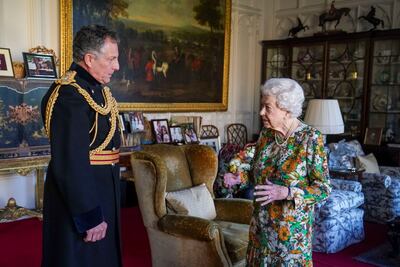Waging a war against Iran because of its controversial nuclear programme will be a failure of statecraft, the former head of the British armed forces has said.
While the military option should be in the background as a means of deterrence during diplomatic talks, the use of force against Iran should be avoided, Retired Gen Sir Nick Carter said in an exclusive interview with The National, two months after his retirement as chief of defence staff.
“What needs to happen here is that the diplomats need to get around the table and deals need to be struck,” he said. "We don’t want to see the military instrument being used. It will be a failure."
Negotiations between Iran and major western powers, as well as China and Russia, resumed in November and there is cautious optimism that a deal could be reached.
The Vienna talks are aimed at reviving a 2015 deal between Iran and six world powers, which offered Tehran sanctions relief in exchange for restrictions on its nuclear programme.
In 2018, US President Donald Trump withdrew the US from talks and reimposed economic sanctions on Iran.
In response, Tehran abandoned its commitments.
There has recently been a change in Israel’s position away from opposition to the deal.
Defence Minister Benny Gantz and Foreign Minister Yair Lapid said that Israel could support a deal that is viewed as offering checks on Iran’s nuclear ambitions.
Iran insists its nuclear programme is solely for civilian purposes.
Mr Carter, who is scheduled to attend Intersec, the world-leading emergency services, security and safety event, next week in Dubai as the main speaker, shared his insights after a 44-year military career.
Asked whether Iran could be playing for time in Vienna until it developed a nuclear weapon, he said it was not in anyone’s interest, including Iran and the region's close trading partners such as China, to move towards military confrontation.
“They don’t want this region to go upside down,” he said. "My view is that this will be controlled, because it isn’t in Iran’s interests ultimately to become a pariah like North Korea."
Asked whether the UK has taken part in exercises against mock Iranian nuclear installations, Mr Carter said “No.”
Mr Carter joined the army in 1977 and served in Germany during the Cold War, in Northern Ireland during the Troubles, in Cyprus with the UN and in command of a battalion for operations in Bosnia and Kosovo.
In his previous role, Mr Carter was the head of the British Armed Forces and the most senior military adviser in uniform to the secretary of state for defence and the prime minister.
In Iraq, he served as a brigade commander during 2003-2004. On tours in Afghanistan between 2002 and 2013, he commanded 55,000 Nato troops.

'Every day is a school day'
After the 9/11 attacks on New York and Washington, the UK joined the US in two very long and costly wars in Afghanistan and Iraq. Critics said military intervention proved unsuccessful, led to unnecessary civilian death and displacement and put soldiers in harm’s way.
Last year, Mr Carter expressed disappointment at US President Joe Biden’s decision to withdraw US troops from Afghanistan.
In his view, an army cannot fight adversaries without “boots on the ground”.
He believes that this approach should still go hand-in-hand with technology and unconventional methods to win wars because “technology can neither control nor hold the ground”.
“While the character of conflict is changing with technology, I think the nature of war, which is fundamentally about the interaction between human beings, that doesn’t change,” he said.
“There’s still going to be a need in future war for human beings to engage. You are going to have to go close and personal, in order to be able to get the resolution that you need.”
As cyber attacks against government agencies and businesses have become common, Mr Carter said that risk management was crucial to prevent them but there is no country that can protect everything.
“You know, you can’t defend everywhere. What you have to do is you have to stand back and say, ‘So what is absolutely critical that I defend?’ And then make sure that your cyber defences are robust and resilient enough to be able to defend the things that really matter.”
Asked how he would describe the Iraq war to successive generations – a war that was condemned by a British public inquiry – Mr Carter said he learnt during his military career the value of humility to acknowledge mistakes and learn from them.
Announced in 2009, the 2.6 million-word Chilcot Report, also known as the Iraq Inquiry, was one of the lengthiest reports on UK government policy, concluding that the US and UK had not exhausted peaceful alternatives to the conflict before invading Iraq.
“I think the advice I would give your 17-year-old or my 22-year-old is, make sure that you remember that every day is a school day.”
“Because if you don’t have the application and the humility to learn, then you are going to make the sorts of mistakes that previous generations have made as well,” he said.

